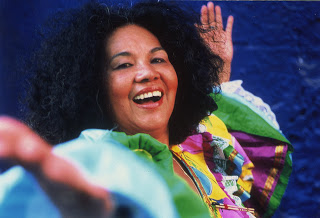At the rhythm of drums, maracas and clarinets, and with the huge faith that grants her the knowledge of being a worthy defender of a culture as rich as the treasures of the Inca emperors, Sonia Bazanta – the name she was baptized with, only known to very few – arrived in Havana.
This form of introducing her does not mean anything to many, but if we call her Totó La Momposina, that is enough to bring out the Caribbean element we all carry in our blood and dance until exhaustion following her world-famous drums.
A Colombian through and through, of African descent, in addition, Totó has all the necessary ingredients to achieve García Márquez’s magic of turning music into something real and marvelous.
“I feel immense love and appreciation for this Island, small and at the same time huge in music”, were her first words for OnCuba at her arrival in Havana, which welcomes her as special guest of the First Meeting of Popular Voices.
Her show, with due respect to all the participants in the event, is undoubtedly the one with the greatest cultural importance of this meeting, aimed at highlighting the most autochthonous values of Iberian American peoples.
The strength of her chants and the suggestive atmosphere created by the percussion musicians accompanying her, embody one of the most interesting tasks of rescue and promotion ever undertaken by a music group.
Cuba knows the values of La Momposina, who comes from a family of percussion musicians already four generations old. “A long time ago I received the gift of calming down with my voice the force of the spirits brought from Africa by the slaves”, she admits.
That is why next year she will receive the Prize of the Festival of the Caribbean, a distinction delivered on each issue of that meeting with the culture of the peoples in the region.
With an impressive music career, Totó has been in the list of participants of the most diverse events. Suffice it to mention that even the Swedish monarchs witnessed the magic of her drums while García Márquez (“Gabo”) was awarded the Nobel Prize in Literature of 1982.
Thousands have enjoyed her performances at the Cervantes Festival of Guanajuato and the Music Festival of the Caribbean in Cancun, both in Mexico, or at the Latin American Night during the celebrations of the bicentennial of Argentina’s independence, in 2010.
Her conscientious attitude in favor of the needed in these lands is noticeable in all her work and in the themes of her songs. The way she assumes her art, making no distinctions of stages or publics, has turned her into one of the dearest artists of these latitudes.
Her position in the face of the social problems of the continent and the peculiarity of her voice made her the perfect candidate to record, together with Peruvian Susana Baca, Brazilean María Rita and Calle 13, the theme “Latin America”, from the much-awarded album of the famous Puerto Rican duo “Entren los que quieran” (Those who wish may come in).
La Momposina has not let herself be falsely impressed by the museum-like windows of the old Europe like Paris, Rome, Berlin, Stockholm, London or Madrid, nor by the huge skyscrapers and multi-cultural nature of New York.
Her life is in the Colombian Caribbean, the one that, bathed by the clear waters of the sea, allows her to sing to her ancestors, to those who wake up with the sound of the drum and look after the health and luck of those who adore them.










